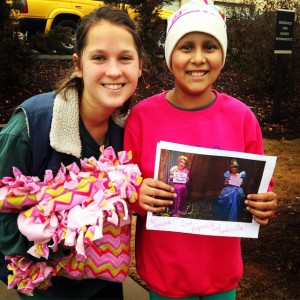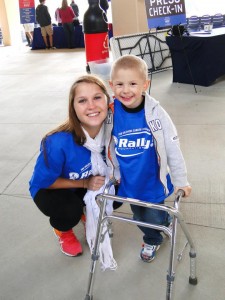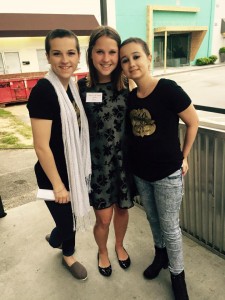The following composition represents the culmination of around three years of reflections and writings. In 2012, I faced a tragedy that took a great emotional toll on my heart, leaving a scar that would take many months to heal. This article is the story of that tragedy and of the woman that helped me get through it. I have always wanted to thank her for the role she played in my life, and thanks to the encouragement from the Wish Dish program, I am finally seizing the opportunity to put my gratitude into words.
“Now,” Mrs. Taylor said, sliding her copy of Tim O’Brien’s book, The Things They Carried, onto her cluttered podium, “I want all of you to take out your purses and wallets and empty them onto the table in front of you. That’s right – everything: cards, receipts, licenses, everything! Now it’s time to take a look at the things you carry.” Scattering the contents of my authentic Ecuadorian-leather wallet onto my group’s table, I began to examine all of my possessions.
The exercise was intended to help us identify ourselves from merely our current pocket fillings; little did I know that this woman would soon become an integral piece of my identity herself.
Jo Taylor is the ringleader of the circus known as George Walton Academy’s English department. This prestigious menagerie produces an eclectic collaboration of (arguably) the finest writers, poets, and performers that the Atlanta area has to offer. Mrs. Taylor’s proficiency lies with the instruction of Advanced Placement English courses and the production of professional writers and enthusiastic lovers of the drafted arts.
I first encountered Mrs. Taylor at the end of my tenth-grade year at George Walton Academy at the annual awards ceremony.
I had been summoned to the front of the gymnasium that evening to receive a certificate for an accomplishment acknowledged by the English department. As I walked across the stage to accept my paper prize, Mrs. Taylor extended a hand in congratulations. Behind a wide smile, she whispered, “I look forward to teaching you next year.” The chill from her cold hands crept over my skin, driving fear into my entire being. For reasons I could not pinpoint, this woman paralyzed me with intimidation.
This dread lingered into Mrs. Taylor’s classroom when I began attending her Advanced Placement English Language and Composition course the next scholastic year. My first impression of Mrs. Taylor as a teacher struck another chord of horror on the first day of class. Most of my teachers from over the years should attest to the claim that I am often quiet during class discussion, as I prefer to listen and find the value in both sides of a debate rather than contribute to the bickering or pick a side.
Naturally, Mrs. Taylor stepped off the wrong foot when she announced that, on the seemingly simple “syllabus day,” our class would immediately play host to a group discussion with a single rule: “If you do not talk, then you fail.”
Thus I survived. The first few months of eleventh grade proved an effective albeit brief period of growth and development, both in and out of the classroom. Yet my true transformation was still underway. “Well,” Mrs. Taylor conceded, peering at us over the rims of her leopard-print glasses, “The first round of descriptive essays was a relative success. Now, let’s move on to describing people.”
In late November, 2012, my fellow AP Language students and I had just completed a descriptive assignment in which we were to describe a location that held sentimental value for us. I had scarcely stapled the pages of my “Savannah Sunrise” essay when Mrs. Taylor had issued the order for a new descriptive assignment, this time calling for the characterization of an influential person in each of our lives.
At first, I considered a revision of a recently submitted narrative in which I would nominate an esteemed track coach as my honorable idol. However, I then recalled a recent visit to Great Oaks Assisted Living Home and my decision came clear.
I would focus my next essay on my deeply revered great grandmother, Thelma Lawrence Towler.
In my youth, I had often found visiting Grandma Towler more of a dull obligation rather than an exciting opportunity. My brother and cousins would sooner run around the tall grass outside the home, playing Power Rangers or Jedi Knights and leaving the adults to their boring conversations.
But, as I grew into my teenage years, I found myself finding every excuse to swing by Great Oaks, popping in on holidays to trick-or-treat with all of the residents or sneaking into polka concerts in the dining hall (which my grandmother described as “turr-a-bull,” but she was always too polite and social to miss such a function).
As my visits grew more frequent, I began to realize just how fascinating and inspirational Grandma Towler was. We would often settle on the patio behind Great Oaks, relax in the refreshing sun on a chilly autumn afternoon, and watch the koi fish in the small pond. We shared stories about our lives, mine taking place over the previous weeks, hers spanning decades.
One of her favorite tales was of her teaching career a Pleasant Valley School. She taught for thirteen years in the small schoolhouse and she loved her job. The school requested that she teach Algebra, but she knew little to nothing of the subject. So, instead of giving up or forcing her students to teach themselves, she stayed up late every night before class and taught herself the necessary materials for conducting a reasonable class. Studying with her students, she was a remarkable teacher as well as a lifelong learner.
She would listen to all of my stories with the same excitement with which she told her own.
She always wanted to know where I traveled that summer or what race I had run in cross country. She would brag about all of my accomplishments to all of her friends and soon enough, she had built a bit of a reputation for me within the halls of Great Oaks (as one of the most popular residents, she certainly possessed that authority). She was truly interested in my life and all I had to say.
She was biggest supporter, my number-one fan, my motivation, and my beloved great grandmother.
When Mrs. Taylor presented me the opportunity to immortalize my great grandmother, I was more than eager to commence construction on my penned portrait. Mrs. Towler was the woman in my family with whom I held in the utmost regard. She was undoubtedly the kindest, wisest, most selfless, and most influential person I could imagine (not to mention the prettiest – having just celebrated her 99th birthday the previous September, she did not look a day over 80).
The matriarch of my paternal grandmother’s family, she was my oldest living relative, and I could not imagine a better subject for my descriptive assignment.
My paper seemed to write itself; poetic portrayals flowed from my racing mind and onto the page like paint to a canvas, molding a near tangible image of Mrs. Towler behind lines of letters. In a jovial tone, I recreated my ever-optimistic grandmother’s attitude with my words, pouring not only my memories but also my emotions into my work.
The assignment’s due date arrived, and I sauntered cheerily into Mrs. Taylor’s classroom, requesting to read my creation aloud to share with my classmates. After conjuring chuckles and grins from my peers with my amusing article, Mrs. Taylor rose. “Well done,” she smiled, “Clean it up a little, put a pretty bow on it, and you’ve got yourself a perfect Christmas gift for your great grandmother!”
While I did not necessarily roll the essay up into a scroll as my English teacher had explicitly suggested, I took Mrs. Taylor’s advice and prepared a revised draft of the paper to present to my beloved great grandmother on Christmas morning. I typed up a refurbished essay, slipped each page into a clear sheet-protector, and organized the article in a purple folder with Mrs. Towler’s name on the cover.
December 25 blew in as cold as the winter winds it accompanied, and my family began our pilgrimage to Aunt Connie’s house for the annual Towler Family Christmas luncheon.
When Aunt Susan pulled into the driveway with Mrs. Towler riding shotgun, a handful of uncles and I stepped outside to assist with our grandmother’s final stages of transportation. Facing her toward the driveway, we lifted her wheelchair and carried her down the small set of wide stone steps leading to the front door. No matter how many times we engaged in this well-rehearsed maneuver, I always feared a slip of a grip or a tilt too far backwards.
Quite contrarily, Mrs. Towler seemed to enjoy each ride as she exhibited a small fit of giggles, as giddy as the schoolgirls she had taught in the schoolhouse so many decades ago. Turning her wheelchair to face me, she greeted me with her catchphrase in the classic southern drawl, slow and sweet as molasses. “Lord, have mercy! Look who I see.”
I gave Mrs. Towler a hug and wished her a Merry Christmas, all the while eagerly awaiting the gift exchange and thus the revelation of my praiseful essay. However, before we could get down to business with the presents, the congregation had to uphold the sacred tradition of a honey-baked feast.
The events that followed occurred in an instance, but played through in slow-motion. The adults were all lined up in the kitchen, preparing plates for themselves and each other.
As my grandfather prepared a plate for Mrs. Towler, my great grandmother attempted to excuse herself from the kitchen so as not to serve as an obstacle for the rest of the family. A plate shattered. I heard a tumbling commotion coming from the large flight of hardwood steps leading to the basement. A shout, “Mrs. Towler!” A collective gasp. The room grew silent as we all shifted our gaze to the top of the stairwell.
My father was the first to react, already finding himself halfway down the stairs before I had even processed exactly what had occurred. In her attempt to evacuate the crowded kitchen, Mrs. Towler had neglected to check over her shoulder. In a horrifying matter of seconds, she had fallen down the entire flight of wooden stairs, onto the tile floor several meters below, her wheelchair crashing down on top of her.
Call 911! Grab ice from the freezer! Here, take this towel! My mind stood still as my body raced into action. I was trying to prevent myself from perceiving what my eyes were sensing. A shallow pool of blood began to fill the spaces between the tiles on the landing. I heard a weak groan; my great grandmother had remained conscious during the entire fall. My father propped her upright against the wall, and I could feel myself trembling as I laid eyes upon her battered face, a stream of crimson streaking from her nose.
The ambulance arrived in a prolonged matter of minutes, and the paramedics immediately jumped into action. As the respondents lifted her swollen hand, Mrs. Towler refused to let them remove her wedding ring. Together, the two EMTs lifted her onto a stretcher. As they carted her into the ambulance, she held onto my father’s hand.
“I didn’t break Connie’s plate, did I?” she inquired as the doors shut behind her.
Thelma Lawrence Towler died on December 28 at 99 years old. Holding my great uncle Ralph’s hand from her hospital bed, she stirred from a restless sleep late on the night of December 27. She looked into her son’s eyes and whispered faintly, “Why are you prolonging this?” The next morning, following a frantic call from my grandfather, I raced to hospital with my brother and cousin, but we arrived moments too late.
Rushing through the doors to the ICU, I came across a scene in which my grandmother was passing an inquisitive nurse. “My mother died today.” When our family crowded together in the small hospital room for one last look at our beloved matriarch, Uncle Ralph turned to my grandmother – his sister and the oldest of Mrs. Towler’s children – and said, “Well, here’s to the dawning of a new era; a new matriarch.”
The purple folder under the tree was picked up one last time. Mrs. Towler was never permitted the opportunity to read the essay I had written for her. Instead, I read the paper aloud as a contribution to her eulogy at her funeral service.
But I am not writing this piece to mourn the loss of my beloved great grandmother. I have said what I have needed to say, again and again. I have learned to cope with the loss largely though my writings about the woman and the event. Rather, this is the story of how I learned to cope with this loss, and how help came from where I did not expect it.
When classes resumed in January, 2013, I tried to mask the feelings of anguish towards my loss by donning a façade of feigned happiness. A week passed and the pain was still fresh on my mind. I was out at dinner with some friends at a local Japanese restaurant when I ran into Mrs. Taylor on my way out of the eatery. I greeted her with a weak smile.
She pulled me aside, concerned: “Why didn’t you tell me? I had no idea… If there’s anything you ever need, let me know. I’m always here for you.” My eyes filled with tears as I looked into my English teacher’s eyes, and she pulled me in for a much needed embrace. At that moment, I felt as if a hole in my heart had become somewhat filled.
While my great grandmother Towler could never be replaced, I wholeheartedly believe that Mrs. Taylor managed to take over Mrs. Towler’s role. After she took a personal interest my life, I knew that Mrs. Taylor had become so much more than a teacher to me. Perhaps she would even become my very own Mama Jo.
That year, my life seemed to take an unexpected turn. With Mrs. Taylor’s now evident attention, I subconsciously redirected my own attention. I began to take AP Language more seriously as I significantly developed my skills as a writer. For years, I had thought myself determined to pursue a career in medicine, but I took on a completely new interest in the field of writing, turning to narratives and descriptions of my own life and experiences as a creative outlet.
Moreover, the experience transformed the way I viewed other people.
Mrs. Taylor’s concern for my personal life inspired me to take my friends’ lives into greater consideration. I developed a proclivity to become emotionally invested in my peers as I grew closer to my current friends than ever before, cherishing each memory with a good pal and taking no moment for granted.
With arms stretched wider, I began reaching out to new friends more openly and warmly, eager to seek out new ;relationships to treasure. My relationships with teachers were affected as well; I have found new respect and appreciation for the quasi-parental figures of my life.
Most of all, I attribute my maturation in eleventh grade to Mrs. Taylor’s intervention. I had now experienced the real world, and I have prepared myself to tackle whatever life throws my way. Because of my year with Mrs. Taylor as my mentor, my personality had transformed in ways that were once unimaginable. I owe that transformation, along with my utmost gratitude, to Jo Taylor.
Without her, there is no telling how I would have coped with my great grandmother’s passing, how I would have grown academically, or how I would function socially. My Mother Jo has taken an everlasting stand as a cornerstone of my identity, and I have no doubt that she will continue to inspire me through the progression of my college career and adult life. Furthermore, I am certain that I will be able to count on Mama Jo for anything and everything. I know she will always be there for me.
So, finally, I offer to my audience this parting advice: never for one moment let yourself believe that you are alone in this world. There is and always will be somebody to look after you, to talk with you, to make sure that you are happy. In addition, always try to be that person for somebody else. Show them kindness and compassion, and they will come back to return the favor.
Lastly, do not take a single life for granted; you never know where you will find your Mama Jo.

 I am very grateful for the opportunity to make a difference in these parents’ lives and happy that my club will be continuing next year, even when I am no longer a student. My club members are passionate about this cause, and I hope more colleges will be inspired to start their own chapters.
I am very grateful for the opportunity to make a difference in these parents’ lives and happy that my club will be continuing next year, even when I am no longer a student. My club members are passionate about this cause, and I hope more colleges will be inspired to start their own chapters.





